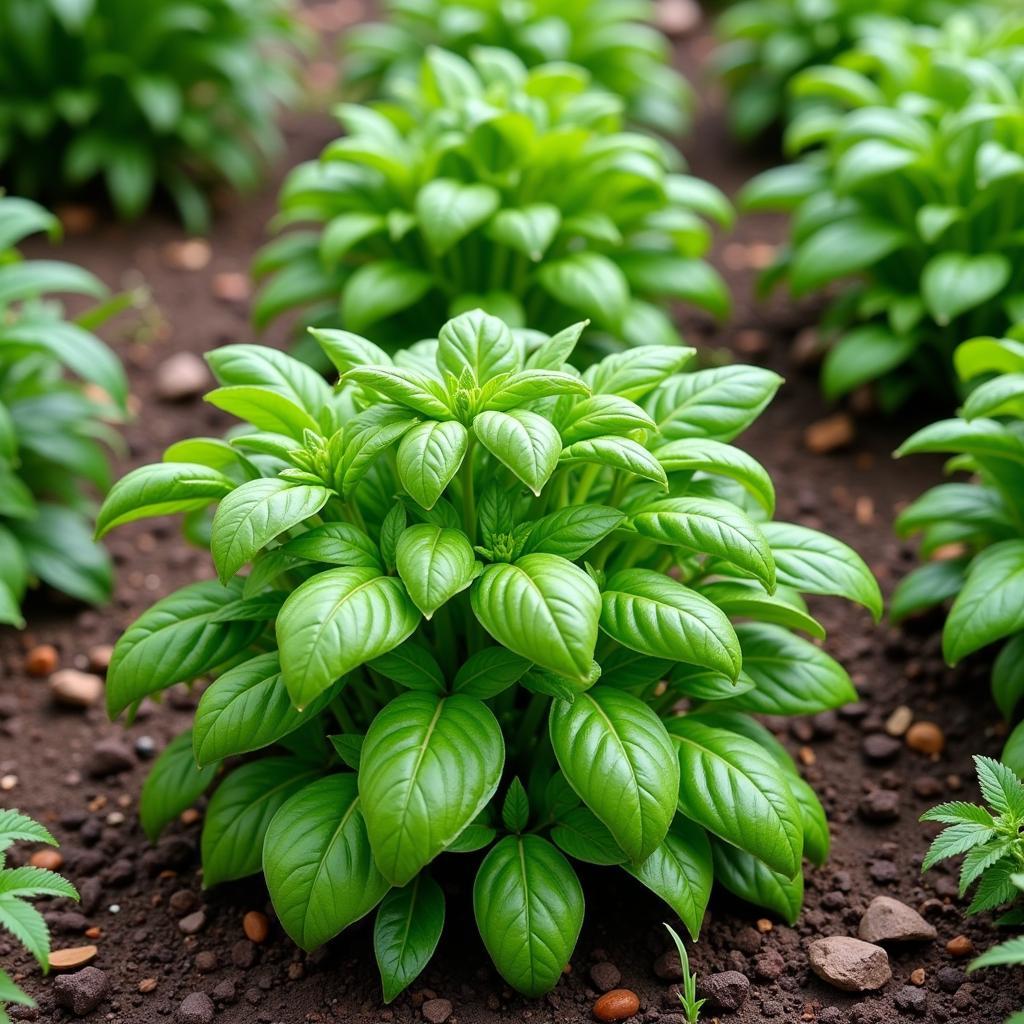Dünger Basilikum: The Secret to Growing Lush, Flavorful Basil
October 25, 2024Dünger Basilikum, or basil fertilizer, is crucial for growing healthy and productive basil plants. Whether you’re a seasoned gardener or just starting out, understanding the right fertilizer for your basil will significantly impact its growth and flavor. This article explores the best dünger basilikum options, application methods, and other essential tips for growing thriving basil.
Understanding Basil’s Nutritional Needs
Basil, like all plants, requires a specific balance of nutrients for optimal growth. Nitrogen (N) is essential for leafy growth, phosphorus (P) for strong root development, and potassium (K) for overall plant health and disease resistance. Dünger basilikum should ideally provide these nutrients in the right proportions. A balanced fertilizer, such as a 10-10-10 or a similar NPK ratio, is a good starting point. However, you can also tailor your dünger basilikum choices to your basil’s specific needs based on its growth stage and growing conditions.
Choosing the Right Dünger Basilikum
Several types of dünger basilikum are available, each with its own advantages and disadvantages. Organic fertilizers, like compost and worm castings, improve soil health and provide slow-release nutrients, promoting sustainable growth. Synthetic fertilizers, on the other hand, offer a quick nutrient boost but may not be as beneficial for the long-term health of your soil. Liquid fertilizers are easy to apply and are absorbed quickly by the plants, making them ideal for correcting nutrient deficiencies. Granular fertilizers are a good choice for providing a steady supply of nutrients over time. Choosing the right dünger basilikum depends on your preferences and the specific needs of your basil plants.
Applying Dünger Basilikum Correctly
Applying dünger basilikum correctly is just as important as choosing the right type. Over-fertilizing can lead to nutrient burn, while under-fertilizing can result in stunted growth. For young basil seedlings, start with a diluted solution of liquid fertilizer or a light application of granular fertilizer. As the plants grow, increase the frequency and strength of the application according to the instructions on the fertilizer package. It’s also crucial to water the plants thoroughly after applying fertilizer to help distribute the nutrients evenly and prevent burning the roots.
Other Essential Tips for Growing Basil
While dünger basilikum is essential, other factors also contribute to healthy basil growth. Adequate sunlight is crucial, so choose a location that receives at least six hours of direct sunlight daily. Well-drained soil is also important to prevent root rot. Regularly pruning your basil will encourage bushier growth and prevent it from flowering prematurely, which can affect the flavor of the leaves.
Beyond Dünger Basilikum: Natural Alternatives
While commercial dünger basilikum can be effective, you can also utilize natural alternatives. Compost tea, made by steeping compost in water, is a rich source of nutrients and beneficial microbes. Epsom salts, rich in magnesium, can promote lusher foliage. Banana peels, buried near the roots, provide a slow-release source of potassium. These natural methods offer sustainable and cost-effective ways to enhance your basil’s growth.
Ensuring Optimal Basil Growth
Dünger basilikum plays a vital role in ensuring your basil thrives. By understanding your basil’s needs, choosing the right fertilizer, and applying it correctly, you can achieve optimal growth and flavor. Combining these practices with proper sunlight, watering, and pruning will result in an abundant harvest of delicious basil to enjoy in your culinary creations.
 Basil Growing in a Home Garden
Basil Growing in a Home Garden
Conclusion
Dünger basilikum is the key to growing healthy, flavorful basil. Whether you choose organic or synthetic options, remember to apply it correctly and combine it with other essential care practices. With the right dünger basilikum and a little attention, you can enjoy a bountiful harvest of fresh basil all season long.
FAQ
- How often should I fertilize my basil?
- What are the signs of over-fertilization in basil?
- Can I use coffee grounds as dünger basilikum for basil?
- What is the best NPK ratio for basil fertilizer?
- How do I make compost tea for my basil plants?
- When is the best time to apply dünger basilikum to basil?
- What are some natural alternatives to chemical fertilizers for basil?
Situations where these questions are asked:
- Gardening forums
- Social media groups dedicated to gardening
- Online plant care resources
- In conversations between gardeners
Suggested further reading on our website:
- The Ultimate Guide to Growing Basil
- Companion Planting for Basil: Best and Worst Choices
- Harvesting and Preserving Basil: Tips and Tricks
Contact us for assistance at Phone Number: 0915117113, Email: [email protected] or visit us at Address: To 3 Kp Binh An, Phu Thuong, Vietnam, Binh Phuoc 830000, Vietnam. We have a 24/7 customer support team.